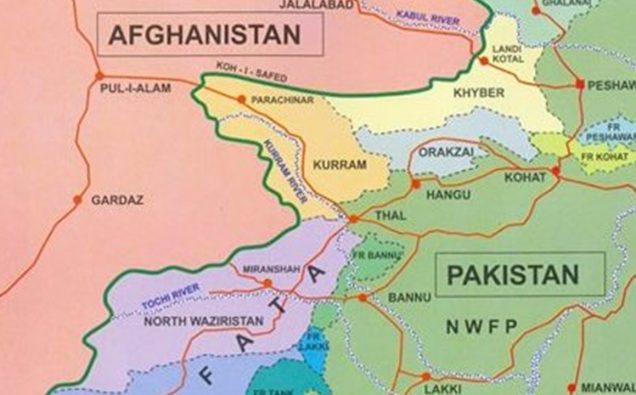
A map showing Pakistani tribal areas along Afghan border, Photo: Hbtila/Wikimedia Commons
Pakistan has reacted to the latest U.S. announcement of suspending nearly all security assistance with a reminder of the importance of counterterrorism cooperation.
Islamabad mixed its perceptions of diminishing alliance with keeping open a diplomatic recourse to the issues between the two countries and finding a common ground.
In Islamabad, a Foreign Ministry spokesman said efforts are still on to find common ground with U.S. and taking joint steps to address mutual concerns.
But in an interview with The Wall Street Journal, Foreign Minister Khawaja Muhammad Asif complained that Washington had turned Pakistan into a “whipping boy” for its own shortcomings in Afghanistan.
“We do not have any alliance” with the United States, the foreign minister said following President Trump’s tweet suggesting Islamabad had been deceitful and untruthful in dealings with Washington.
“This is not how allies behave,” he said.
The United States has foolishly given Pakistan more than 33 billion dollars in aid over the last 15 years, and they have given us nothing but lies & deceit, thinking of our leaders as fools. They give safe haven to the terrorists we hunt in Afghanistan, with little help. No more!
— Donald J. Trump (@realDonaldTrump) January 1, 2018
In Washington, Pakistan’s ambassador Aizaz Chaudhry said Islamabad is engaged with the U.S. Administration on the issue of suspension of security aid.
“It, however, needs to be appreciated that Pakistan has fought the war against terrorism largely from its own resources which has cost over $120 billion in 15 years.
In a statement released to the media, Chaudhry also reminded everyone of the vital significance of counterterror cooperation between the two countries.
“We believe that Pakistan-US cooperation in fighting terrorism has directly served US national security interests. It has helped fight Al-Qaeda and other groups who took advantage of ungoverned spaces along a long porous border and posed a common threat to both countries. Through series of major operations Pakistan cleared all these areas resulting in significant improvement in security in Pakistan. A similar action needs to be taken on the Afghan side which has vast stretches of ungovernd spaces.
“Working towards enduring peace requires patience and persistence. Emergence of new and more deadly groups such as Daesh in Afghanistan call for enhancing international cooperation.
“Diplomacy of deadlines and red lines is counterproductive in meeting such common threats.”
On Thursday the State Department announced that security assistance to Islamabad was on hold until the Pakistani government took “decisive action” against terror groups on its territory, including the Afghan Taliban and the Haqqani Network.
Asif told Journal that through a series of military campaigns in the tribal areas, Pakistan has cleared the country of both the organized presence of militants and areas where they might seek sanctuary as peace returns.
The foreign minister also hinted at thee possibility of cooperation from other members of the international community.There are other countries that could ally with Pakistan, Asif said. Last year, Pakistan brought together officials from China, Iran, Russia and Turkey behind Pakistan’s strategy for Afghanistan, a process centered on peace talks with the Taliban.
Amid US-Pakistan tensions, the Chinese foreign ministry has said it is “ready to promote and deepen” its cooperation with Pakistan.
“We are not alone,” Asif said, according to a Journal report.





![Pakistan troops in North Wazirstan triba area Hbtila at en.wikipedia [GFDL (http://www.gnu.org/copyleft/fdl.html), CC-BY-SA-3.0 (http://creativecommons.org/licenses/by-sa/3.0/) or CC BY-SA 2.5-2.0-1.0 (https://creativecommons.org/licenses/by-sa/2.5-2.0-1.0)], via Wikimedia Commons](https://www.viewsnews.net/wp-content/uploads/2018/01/North_waziristan_clearence.jpg)










